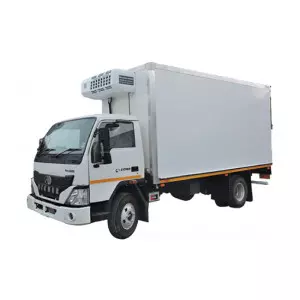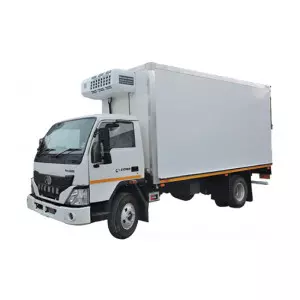Refrigerated Van Manufacturering In Jamnagar
Details of Refrigerated Van
Comprehensive Guide for Industrial Applications
Refrigerated vans serve as critical transport vehicles designed specifically to carry temperature-sensitive goods while maintaining strict climate control throughout the journey. These vans incorporate advanced refrigeration systems and robust insulation to preserve perishable products such as fresh food, pharmaceuticals, flowers, and chemicals. In industries ranging from food supply chains to healthcare logistics, refrigerated vans ensure products arrive in optimal condition, minimizing spoilage and maintaining regulatory compliance.
Temperature Control Range
These vans are capable of maintaining a wide temperature spectrum, from deep freeze conditions at -25°C to mild cooling at +25°C. The ability to precisely control the internal temperature is vital to accommodate various product types, such as frozen foods requiring sub-zero temperatures or fresh produce needing cool but above-freezing environments.
Capacity and Dimensions
- Refrigerated vans come in varied sizes tailored to different transport needs:
- Small vans with 3 to 6 cubic meters capacity serve last-mile deliveries or small businesses.
- Medium-sized vans ranging from 7 to 15 cubic meters are suitable for regional distribution.
Industrial and Chemical Transport
Certain chemicals and industrial materials demand temperature control to prevent degradation or hazardous reactions. Refrigerated vans are employed to move such materials safely between manufacturing units, warehouses, and clients.
Manufacturing Process of Design Engineering
The process begins with detailed design work focusing on optimizing insulation thickness, refrigeration system placement, and vehicle aerodynamics to reduce energy consumption and maximize payload capacity. CAD and simulation software assist in refining thermal performance and structural strength.
Quality Assurance and Testing
Finished vans undergo rigorous testing, including temperature uniformity checks, insulation integrity inspections, and refrigeration unit performance evaluations under various operating conditions. Road tests assess mechanical reliability and cooling stability.
Benefits of a Refrigerated Van
| Benefit | Description |
|---|---|
| Precise Temperature Control | Ensures stable temperature maintenance, preventing product degradation. |
| Expanded Market Reach | Enables delivery to distant locations without compromising product quality. |
| Regulatory Compliance | Facilitates adherence to food safety and pharmaceutical transport regulations. |
| Product Freshness and Safety | Reduces spoilage and contamination risks, preserving product integrity. |
| Versatility and Customization | Adaptable to various cargo types with options for shelving, partitions, and multi-zones. |
| Cost Efficiency | Minimizes losses from damaged goods, improving supply chain profitability. |
Installation Guidelines for Refrigerated Van Pre-Operation Checks
Before each use, it is critical to verify that refrigeration units are functioning correctly and that insulation panels and door seals are intact. Any visible damage should be repaired promptly to maintain performance.
Offered Product
Refrigerated Van
Looking For The Best Way To Transport Temperature-sensitive Goods? Check Out Our Top-of-the-line Refrigerated Vans, Proudly Made In Ahmedabad! These Vans Are Crafted With Precision Engineering And Come Equipped With Cutting-edge Insulation Technology And Robust Refrigeration Systems, Ensuring That Your Perishable Items—like Food, Pharmaceuticals, And Other Delicate Materials—stay At The Perfect Temperature During Transit. With Customizable Sizes And Configurations, Our Refrigerated V... Read moreRefrigerated Van Manufacturers In Hubballi-Dharwad
Leveraging Our Vast Experience In Refrigerated Transport Responses, We Offer A Competitive Assortment Of Refrigerated Vans Suitable For Safe And Efficient Goods Transport In Hubballi-Dharwad. These Vehicles Are Built Using High-quality Materials And Advanced Refrigeration Technology To Ensure Optimal Temperature Control And Operational Reliability. They Are Ideal For Transporting Perishable Goods Across Short And Long Distances While Maintaining Product Quality in Karnataka. This Van Is Tho Continue
Refrigerated Van Manufacturers In Jalgaon
Being A Quality Centric Firm In The Market, We Are Engaged In Giving Best And Most Authentic Quality Assortments Of Refrigerated Van Designed For Safe Transportation Of Temperature Sensitive Products. Equipped With Advanced Cooling Units And Insulated Body Structure, It Maintains Consistent Internal Temperature During Transit. Ideal For Dairy, Food And Pharmaceutical Distribution, It Ensures Product Integrity And Reliable Logistics Performance.Technical SpecificationsTemperature Range: 2&d Continue
Refrigerated Vans For Temperature Controlled Transportation
Built To Safeguard Perishables During TransitWe Supply Commercial Refrigerated Vans Manufactured For Transporting Temperature-sensitive Goods Like Dairy, Pharmaceuticals, Seafood, Frozen Foods, And Flowers. These Vehicles Ensure Consistent Cooling Across Long Distances Under Varying Weather Conditions.Designed For Critical Cold Chain ApplicationsThese Products Are Used In Diverse Industrial And Commercial Applications Where Thermal Insulation, Cooling Unit Efficiency, And Storage Integrity Continue




